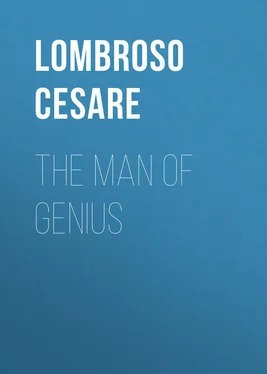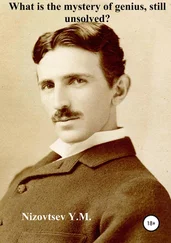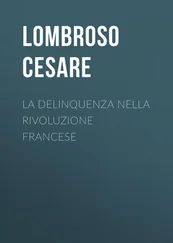Cesare Lombroso - The Man of Genius
Здесь есть возможность читать онлайн «Cesare Lombroso - The Man of Genius» — ознакомительный отрывок электронной книги совершенно бесплатно, а после прочтения отрывка купить полную версию. В некоторых случаях можно слушать аудио, скачать через торрент в формате fb2 и присутствует краткое содержание. Жанр: foreign_antique, foreign_prose, на английском языке. Описание произведения, (предисловие) а так же отзывы посетителей доступны на портале библиотеки ЛибКат.
- Название:The Man of Genius
- Автор:
- Жанр:
- Год:неизвестен
- ISBN:нет данных
- Рейтинг книги:5 / 5. Голосов: 1
-
Избранное:Добавить в избранное
- Отзывы:
-
Ваша оценка:
- 100
- 1
- 2
- 3
- 4
- 5
The Man of Genius: краткое содержание, описание и аннотация
Предлагаем к чтению аннотацию, описание, краткое содержание или предисловие (зависит от того, что написал сам автор книги «The Man of Genius»). Если вы не нашли необходимую информацию о книге — напишите в комментариях, мы постараемся отыскать её.
The Man of Genius — читать онлайн ознакомительный отрывок
Ниже представлен текст книги, разбитый по страницам. Система сохранения места последней прочитанной страницы, позволяет с удобством читать онлайн бесплатно книгу «The Man of Genius», без необходимости каждый раз заново искать на чём Вы остановились. Поставьте закладку, и сможете в любой момент перейти на страницу, на которой закончили чтение.
Интервал:
Закладка:
All mathematicians admire the great geometer Bolyai, whose eccentricities were of an insane character; thus he provoked thirteen officials to duels and fought with them, and between each duel he played the violin, the only piece of furniture in his house; when pensioned he printed his own funeral card with a blank date, and constructed his own coffin – a vagary which I have found in two other mathematicians who died in recent years. Six years later he had a similar funeral card printed, to substitute for the other which he had not been able to use. He imposed on his heir the obligation to plant on his grave an apple-tree, in remembrance of Eve, of Paris, and of Newton. 164 164 W. de Fonvielle, Comment se font les Miracles , 1879.
Such was the great reformer of Euclid.
Cardan, called by his contemporaries the greatest of men and the most foolish of children – Cardan, who first dared to criticise Galen, to exclude fire from the number of the elements, and to call witches and saints insane – this great Cardan was the son, cousin, and father of lunatics, and himself a lunatic all his life. “A stammerer, impotent, with little memory or knowledge,” he himself wrote, “I have suffered since childhood from hypno-fantastic hallucinations.” Sometimes it was a cock which spoke to him in a human voice; sometimes Tartarus, full of bones, which displayed itself before him. Whatever he imagined, he could see before him as a real object. From the age of nineteen to that of twenty-six, a genius, similar to one which already protected his father, gave him advice and revealed the future. When he had reached the age of twenty-six he was not altogether deprived of supernatural aid; a recipe which was not quite right forgot one day the laws of gravity, and rose to his table to warn him of the error he was about to commit. 165 165 De Vita propria , ch. 45.
He was hypochondriacal, and imagined he had contracted all the diseases that he read of: palpitation, sitophobia, diarrhœa, enuresis, podagra, hernia – all these diseases vanished without treatment, or with a prayer to the Virgin. Sometimes his flesh smelled of sulphur, of extinguished wax; sometimes he saw flames and phantoms appear in the midst of violent earthquakes, while his friends perceived nothing. Persecuted by every government, surrounded by a forest of enemies, whom he knew neither by name nor by sight, but who, as he believed, in order to afflict and dishonour him, had condemned his much-loved son, he ended by believing himself poisoned by the professors of the University of Pavia, who had invited him for this purpose. If he escapes from their hands, he owes it to the help of St. Martin and of the Virgin. Yet such a man in theology had audaciously anticipated Dupuis and Renan!
He declares himself inclined to all vices – wine, gaming, lying, licentiousness, envy, cunning, deception, calumny, inconstancy; he observes that four times during the full moon he found himself in a state of real mental alienation. His sensibility was so perverted, that he never felt comfortable except under the stimulus of some physical pain; and in the absence of natural pain, he procured it by artificial means, biting his lips or arms until he fetched blood. “I sought causes of pain to enjoy the pleasure of the cessation of pain, and because I perceived that when I did not suffer I fell into so grave and troublesome a condition, that it was worse than any pain.” This fact helps us to understand many strange tortures which madmen have voluptuously imposed on themselves. 166 166 Byron said, also, that intermittent fevers came at last to be agreeable to him, on account of the pleasant sensation that followed the cessation of pain.
He had so blind a faith in the revelations of dreams, that he printed a strange work De Somniis , conducted his medical consultations, concluded his marriage, and began his works (for example, that on the Varietà delle Cose and Sulle Febbri ) in accordance with dreams. 167 167 “One day I thought I heard very sweet harmonies in a dream. I awoke, and I found I had resolved the question of fevers: why some are lethal and others not – a question which had troubled me for twenty-five years” ( De Somniis , c. iv.). “In a dream there came to me the suggestion to write this book, divided into exactly twenty-one parts; and I experienced such pleasure in my condition and in the subtlety of these reasonings as I had never experienced before” ( De Subtilitate , lib. xviii. p. 915).
He was impotent up to the age of thirty-four. Virility was given to him in a dream, and to this gift was added, not altogether happily, the cause of his troubles – his future wife, a brigand’s daughter, whom, before this dream, as he asserts, he had never even seen. His unhappy mania even led him to regulate his medical consultations according to his dreams, as he himself boasts of doing in the case of Borromeo’s son. It is possible to cite other examples, sometimes comic, sometimes strange or terrible. I will quote one which unites all these characters: his dream of the jewel.
It was in May, 1560, when Cardan was fifty-two years of age. His son had just been publicly condemned for poisoning. No misfortune could wound more deeply Cardan’s already sensitive soul. He loved his son with all a father’s tenderness, as is witnessed by his fine verses, De Morte Filii , in which there is the imprint of real passion. He hoped also for a grandson who should resemble himself. Drawn more and more into insane ideas by grief, he saw in this condemnation the hands of persecutors. “Thus overwhelmed, I sought distraction in vain in study or in play. In vain I bit myself and struck my arms and legs. It was my third night of sleeplessness, about two hours before dawn. I saw that there was nothing else for me but to die or go mad. Therefore I prayed God to snatch me entirely away from life. And then, against my expectation, sleep took possession of me, and at the same time I heard a person approaching me, whose form I could not see, but who said, ‘Why grieve about your son? Put into your mouth the precious stone which you bear suspended from your neck, and as long as you carry it there you will not think of your son.’ On waking up, I asked myself what connection there could be between forgetfulness and an emerald; but as I had no other resource, I recalled the sacred words, ‘ Credidit et reputatum ei est ad justitiam ’; I put the emerald into my mouth, and then, against all expectation, everything that recalled my son vanished from my memory. It was so for a year and a half. It was only during my meals, and at my public lectures, when I was unable to keep the precious stone in my mouth, that I fell back into my old grief.” This singular cure had its pretext in the double sense of the Italian word gioia , which means at once “joy” and “jewel.” Cardan had, however, no need of the revelation of a genius, for in his own works he had already recognized a consoling virtue in precious stones, due to the bond of this absurd etymology. 168 168 “Jewels in sleep are symbolical of sons, of unexpected things, of joy also; because in Italian gioire means ‘to enjoy’ ( De Somniis , cap. 21; De Subtilitate , p. 338).
A megalomaniac, he called himself “the seventh physician since the creation of the world;” he claimed to know the things which are before and above us, and those which shall come after. 169 169 Buttrini, Girolamo Cardano , Savona, 1884.
Like Rousseau and like Haller, Cardan, during the last days of his tormented existence, wrote his own life; he also foretold the exact date of his death, which he looked for, and perhaps himself brought about, in order that his horoscope should not be made to lie. 170 170 Bertolotti ( I Testamenti di Cardano , 1888) has shown that this legend has no foundation.
Интервал:
Закладка:
Похожие книги на «The Man of Genius»
Представляем Вашему вниманию похожие книги на «The Man of Genius» списком для выбора. Мы отобрали схожую по названию и смыслу литературу в надежде предоставить читателям больше вариантов отыскать новые, интересные, ещё непрочитанные произведения.
Обсуждение, отзывы о книге «The Man of Genius» и просто собственные мнения читателей. Оставьте ваши комментарии, напишите, что Вы думаете о произведении, его смысле или главных героях. Укажите что конкретно понравилось, а что нет, и почему Вы так считаете.












